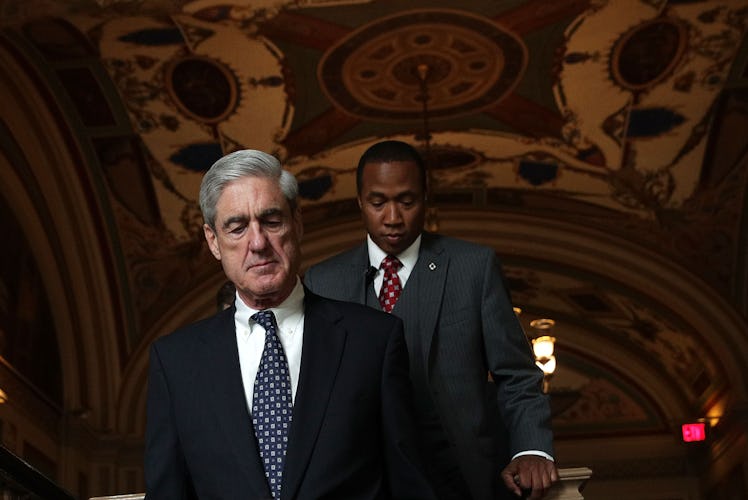
13 Russians Were Charged With Interfering In The Election & Here's What That Means
On Friday, Feb. 16, FBI Special Counsel Robert S. Mueller III issued indictments against more than a dozen individuals. This is the latest development of the investigation into Russian meddling in the American electoral process. The list of who was charged with interfering in the 2016 election — and what they are accused of doing — paints an interesting picture of how the interference allegedly went down.
In the indictment, issued by the Department of Justice, a total of 13 individuals and three organizations were charged with conspiracy to defraud the U.S. Additionally, three of them were charged with conspiracy to commit wire fraud and bank fraud, and five were charged with aggravated identity theft.
In conspiring to defraud the U.S., the indictment alleges, defendants destroyed evidence in an attempt to evade investigators. The alleged activities dated back to 2014, involving computer servers, stolen identities, social media influencing, money transfers, intelligence gathering, and more.
In a Twitter thread, former federal prosecutor Renato Mariotti said, "This is an unprecedented indictment. I'm not aware of another case charging foreign agents with interfering in an election."
While the Russian government wasn't specifically named in the charges, The New York Times points out that the U.S. intelligence community has established its involvement before, saying that Russian President Vladimir Putin greenlighted a pro-Trump political campaign.
Conspiracy to Defraud the U.S.
The first count charged against the defendants describes a variety of means by which they are charged with conspiring against the U.S. The indictment reads,
The conspiracy had as its object impairing, obstructing, and defeating the lawful governmental functions of the United States by dishonest means in order to enable the Defendants to interfere with U.S. political and electoral processes, including the 2016 U.S. presidential election.
Among those means were social media influencing. The document describes how the defendants allegedly made and purchased Facebook ads to promote pro-Trump and anti-Clinton content on social media. Specifically, many of these ads pertained to political rallies they organized leading up to the 2016 election. The ads for the "Florida Goes Trump" rally in August 2016, for example, reached 59,000 people in that state alone, and over 8,000 users clicked on the ad, directing them to a page inducing them to support an online community.
Additionally, the document reads, "Defendants and their co-conspirators, through fraud and deceit, created hundreds of social media accounts and used them to develop certain fictitious U.S. personals into 'leaders of public opinion' in the United States."
Their alleged pro-Trump social media campaign included conducting outreach to targeted individuals asking them to carry out tasks such as sharing the rallies' Facebook events. In one instance, the defendants are alleged to have paid money to a Hillary Clinton impersonator to attend one of the rallies.
Wire and Bank Fraud & Identity Theft
The document lays out 14 occasions between June 2016 and March 2017 in which the defendants and their co-conspirators allegedly accessed bank accounts in order to get around PayPal security.
In addition, the defendants were charged with numerous instances of stealing personal information to create PayPal accounts and bank accounts. The alleged objective: To covertly transfer money into and out of the U.S. for the organization's activity.
So, how does this relate to the 2016 election?
What this means in the context of the election has to do with the Federal Election Committee (FEC) and the Federal Election Campaign Act (FECA), which requires disclosure of political campaign contributions. The indictment states: "Among other things, FECA prohibits foreign nationals from making any contributions, expenditures, independent expenditures, or disbursements for electioneering communications." Also at issue is the Foreign Agent Registration Act (FARA), which requires individuals to disclose their incomes and activities.
As Mariotti wrote in a tweet, conspiring to defraud the U.S. undermines "the ability of the federal government to disclose foreign involvement in our elections."
Friday's indictment tallies as the latest in a string of charges the special counsel has brought as part of the investigation into Russian meddling and corruption around the 2016 election and its preceding campaign. Mueller was appointed to head the investigation in May 2017 after President Donald Trump abruptly fired then-FBI Director James Comey. Since then, he's indicted two Americans: Paul J. Manafort and Rick Gates, both former Trump campaign staffers, and reached a plea deal with a third, George Papadopoulos.